A highway patrol is either a police unit created primarily for the purpose of overseeing and enforcing traffic safety compliance on roads and highways, or a detail within an existing local or regional police agency that is primarily concerned with such duties. They are also referred to in many countries as traffic police, although in other countries this term is more commonly used to refer to foot officers on point duty who control traffic at junctions.
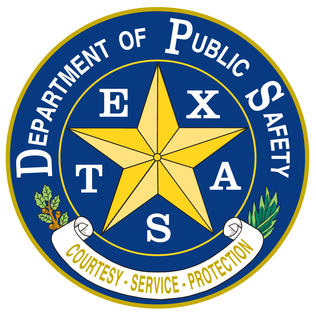
The Department of Public Safety of the State of Texas, commonly known as the Texas Department of Public Safety (DPS), is a department of the state government of Texas. The DPS is responsible for statewide law enforcement and driver license administration. The Public Safety Commission oversees the DPS. However, under state law, the Governor of Texas may assume command of the department during a public disaster, riot, insurrection, formation of a dangerous resistance to enforcement of law, or to perform his constitutional duty to enforce law. The commission's five members are appointed by the governor and confirmed by the Texas Senate, to serve without pay for staggered, six-year terms. The commission formulates plans and policies for enforcing criminal, traffic and safety laws, preventing and detecting crime, apprehending law violators, and educating citizens about laws and public safety.

The Alaska State Troopers, officially the Division of Alaska State Troopers (AST), is the state police agency of the U.S. state of Alaska. It is a division of the Alaska Department of Public Safety (DPS). The Alaska State Troopers is a full-service law enforcement agency which handles both traffic and criminal law enforcement. The Alaska State Troopers is also involved in apprehending fugitives as part of the Alaska Fugitive Task Force, an inter-agency collaborative of Alaska police departments that cooperates with police agencies throughout the United States and less commonly with Interpol in apprehending wanted men and women. Unlike many lower-48 states, Alaska troopers are both state troopers and game/wildlife enforcement officers.

The Washington State Patrol (WSP) is the state police agency for the U.S. state of Washington. Organized as the Washington State Highway Patrol in 1921, it was renamed and reconstituted in 1933. The agency is charged with the protection of the Governor of Washington and the grounds of the Washington State Capitol; security aboard the vessels and terminals of the Washington State Ferries; law enforcement on interstate and state highways in Washington; and providing specialized support to local law enforcement including laboratory forensic services, mobile field forces during periods of civil unrest or disaster, and tactical teams. The State Fire Marshal's Office, responsible for operation of the Washington State Fire Training Academy and for certain aspects of civil defense mobilization, is a component office of the Washington State Patrol, and the State Patrol is the managing agency of the Washington Fusion Center, which coordinates anti-terrorist and anti-organized crime activities within Washington.
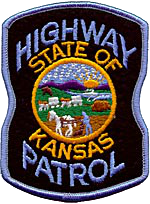
The Kansas Highway Patrol (KHP) is the highway patrol agency for the U.S. state of Kansas. While the patrol's primary focus is maintaining the safety of State, Federal and Interstate highways, it also is charged with providing support for rural and small municipal police departments when tactical, aerial or other specialized services are needed. The Kansas Highway Patrol has statewide jurisdiction, and frequently assists other agencies with emergency calls for service ranging from accidents to fights in progress.
Erwin Ballarta is the Executive Director of the Texas Police Association, a 501(c)(3) association founded in 1895 with the main purpose of promoting professionalism in law enforcement. Ballarta was previously the Executive Vice President of Capitol Strategic Operations He is a self-defense expert in Pekiti Tirsia Kali and various weapons. Ballarta has taught hand-to-hand combat and weapon tactics to the FBI, the Texas Highway patrol, and various military personnel and has been a bodyguard of George W. Bush and various celebrities. He was a Lieutenant with the Texas Department of Public Safety (DPS), where he was the Recruit School Coordinator and Defensive Tactics Coordinator for the Training Academy. He retired from the Texas D.P.S. at the end of August, 2008. He is also president of the Austin Filipino American Association and the Executive Director of the Texas Kali Association.
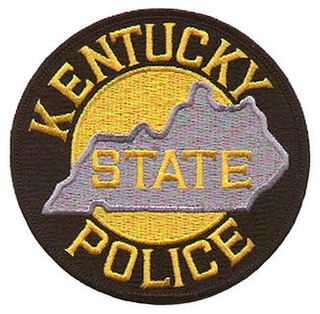
The Kentucky State Police (KSP) is a department of the Kentucky Justice and Public Safety Cabinet, and the official State Police force of the Commonwealth of Kentucky, responsible for statewide law enforcement. The department was founded in 1948 and replaced the Kentucky Highway Patrol. The department's sworn personnel hold the title State Trooper and are addressed as Trooper and its nickname is The Thin Gray Line.
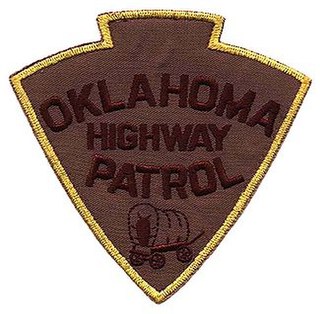
The Oklahoma Highway Patrol (OHP) is a major state law enforcement agency of the government of Oklahoma. A division of the Oklahoma Department of Public Safety, the OHP has traffic enforcement jurisdiction throughout the state. OHP was legislatively created on July 1, 1937, due to the growing problem of motor vehicle collisions, the expansion of highway systems, and the increase in criminal activities.

The Arizona Department of Public Safety (AZDPS) is a state-level law enforcement agency with a primary function of patrolling and enforcing state laws on Arizona highways. Director Heston Silbert was promoted from Deputy Director to Director in April 2020, upon the retirement of former Director Frank Milstead. Its headquarters are in Phoenix.

The Texas Highway Patrol is a division of the Texas Department of Public Safety and is the largest state-level law enforcement agency in the U.S. state of Texas. The patrol's primary duties are enforcement of state traffic laws and commercial vehicle regulation, but it is a fully empowered police agency with authority to enforce criminal law anywhere in the state. Highway patrol troopers are also responsible for patrolling the state Capitol Complex in Austin and providing security to the governor. The current Chief is Lieutenant Colonel Dwight Mathis.

The Oklahoma Department of Public Safety (ODPS) is a department of the government of Oklahoma. Under the supervision of the Oklahoma Secretary of Public Safety, DPS provides for the safety of Oklahomans and the administration of justice in the state. DPS is responsible for statewide law enforcement, vehicle regulation, homeland security and such other duties as the Governor of Oklahoma may proscribe.

The Georgia State Patrol (GSP) was established in March 1937 in the U.S. state of Georgia and is a division of the Georgia Department of Public Safety. It is the primary highway patrol agency for the U.S. state of Georgia. Troopers operate primarily on the state’s Interstate systems conducting speed enforcement and interdicting drugs and other criminal activities. I-95 heading towards Savannah, Brunswick, and the state of Florida is a major location for GSP troopers due to the high volume of drugs and other criminal activity on that interstate. GSP troopers also investigate traffic crashes and enforce traffic and criminal laws on the state's roads.

The Mississippi Highway Safety Patrol is the highway patrol and acting state police agency for the U.S. state of Mississippi, and has law enforcement jurisdiction over the majority of the state.
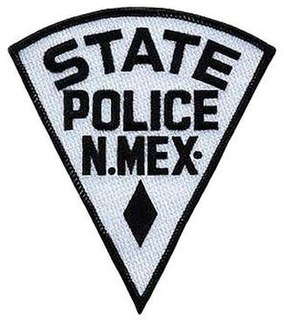
The New Mexico State Police is the state police agency for New Mexico, which has jurisdiction anywhere in the state. It was created to protect the lives, property and constitutional rights of people in New Mexico. The State Police is a division within the New Mexico Department of Public Safety.

The Ohio State Highway Patrol is a division of the Ohio Department of Public Safety and has the primary responsibility of traffic enforcement in the state of Ohio.

The Maryland Natural Resources Police (NRP) is the law enforcement arm of the Maryland Department of Natural Resources (DNR), tasked with enforcing laws on the state's public lands and waterways, protecting fish and wildlife, and leading search and rescue efforts. The Natural Resources Police is also the state's maritime homeland security agency.

The Florida Department of Law Enforcement (FDLE) is a state-wide investigative law enforcement agency within the state of Florida. The department formally coordinates eight boards, councils, and commissions. FDLE's duties, responsibilities and procedures are mandated through Chapter 943, Florida Statutes, and Chapter 11, Florida Administrative Code. FDLE is headed by a commissioner who reports to the Florida Cabinet, which is composed of the governor, the attorney general, the chief financial officer and the commissioner of agriculture. The commissioner is appointed to his position by the governor and cabinet and confirmed by the Florida Senate.
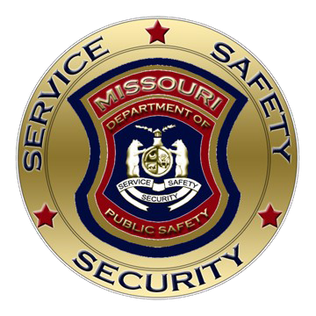
The Department of Public Safety of the State of Missouri, commonly known as the Missouri Department of Public Safety (DPS), is a department of the state government of Missouri.

In the United States, the state police is a police body unique to each U.S. state, having statewide authority to conduct law enforcement activities and criminal investigations. In general, state police officers, known as state troopers, perform functions that do not fall within the jurisdiction of the county sheriff, such as enforcing traffic laws on state highways and interstate expressways, overseeing the security of the state capitol complex, protecting the governor, training new officers for local police forces too small to operate an academy and providing technological and scientific services. They support local police and help to coordinate multi-jurisdictional task force activity in serious or complicated cases in those states that grant full police powers statewide.

The New Mexico Department of Public Safety (NMDPS) is department within the New Mexico Governor's Cabinet. NMDPS is responsible for statewide law enforcement services, training, disaster and emergency response. NMDPS also provides technical communications and forensics support to the public and other law enforcement agencies. NMDPS has the duty to provide for the protection and security of the governor and lieutenant governor.


















